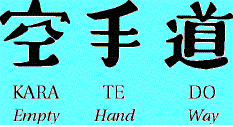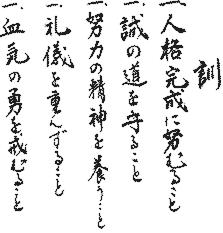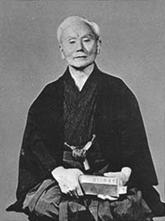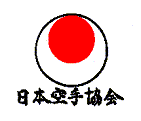
Organization and Affiliation
The Kentucky Shotokan Karate Association (KSKA) is dedicated to the study and teaching
of the traditional Japanese Shotokan Karate. The KSKA was founded by Dr. G. Rod Erfani
in 1986 and is nationally affiliated with the Shotokan Karate-Do International (SKDI),
headquartered in New York, New York. The SKDI's chief instructor, Master Masataka Mori
(8th Dan) directs many regions throughout the Americas. We are also a member of the
Japan Karate Association (JKA), an international organization with member clubs in over
100 countries. The JKA has its headquarters in Tokyo, Japan.
All belt rankings are nationally as well as internationally certified and recognized.
Benefits of Karate Training
Karate training is designed to enhance the total development of the student, disciplining the mind
and training the body. Karate emphasizes many aspects of mental condition -- concentration, discipline,
confidence, and respect for others. Karate also improves many aspects of physical condition --
coordination, strength, flexibility, endurance, and fitness. Students of karate learn to coordinate
body and mind. The practice of karate is an endeavor of developing one's own character. As Master
Funakoshi stated,
History of Karate
It is believed that karate has evolved from a system of physical exercises taught to monks at the Shaolin
Temple in central China's Hunan province in the sixth century. Bodhidharma (Daruma in Japanese), the
founder of Zen Buddhism, developed a new training system to teach the monks at the temple, incorporating
both physical and spiritual aspects into his teaching. In the 16th century, these exercise methods made
their way to the island of Okinawa, a small island off the cost of mainland Japan. These techniques were
combined with native Okinawan fighting art to form modern karate.
Sensei Gichin Funakoshi (1868-1957), the father of modern karate and founder of Shotokan karate, traveled
from Okinawa to mainland Japan in 1917 to demonstrate Karate-Do, the way of empty hand. The Japan Karate
Association was founded in 1948, with Sensei Funakoshi as the chief instructor.
Karate as a sport stresses mental discipline as well as physical strength, and is practiced throughout the
world. Competitive events in both Kata (forms) and kumite (sparring) are held annually on regional, national,
and international levels.

Dojo Etiquette
- Always bow when entering or leaving the dojo.
- Arrive before karate class begins. If you are late, be seated in seiza by the door and wait for permission to join the class.
- Remove your shoes before entering the dojo.
- Remove watches, rings and other jewelry before practice.
- Your Karate-Gi must be kept clean at all times.
- Eating, drinking, chewing gum, and using cell phones are not permitted in the dojo.
- Please keep talking during class to a minimum.
- When Sensei enters the dojo, all students should bow and say "Oss".
- While Sensei is speaking, do not talk or stand with your arms folded, hands on your hips or behind your back.
- Always address the instructor and seniors by their proper title (Sempai or Sensei) inside the Dojo. Acknowledge them with a loud "OSS" or say "Hai (yes) Sensei" or "Hai Sempai" when they speak to you.
- When changing partners during class, you should acknowledge both the partner you are leaving as well as your new partner with a bow.
- Do not teach new techniques or kata to other students unless asked to do so by your teacher.
- Do not practice Kumite unless instructed to do so.
- If you ever need to leave a class early, let the instructor know beforehand.
- Dojo fees must always be paid on time. It is disrespectful to expect the instructor or club secretary to remind you about due dates.
Dojo-kun (Five Guiding Principles of Shotokan Karate)

- Jinkaku kansei ni tsutomuru koto
Seek perfection of character
- Makoto no michi wo mamoru koto
Be faithful
- Doryoku no seishin wo yashinau koto
Endeavour
- Reigi wo omonzuru koto
Respect others
- Kekki no yu wo imashimuru koto
Refrain from violent behavior

"The ultimate aim of karate lies not in victory nor defeat, but in the perfection of the character of its participants"


Gichin Funakoshi, founder of Shotokan karate
Master Gichin Funakoshi's 20 Principles of Karate
- Karate begins with a bow and ends with a bow.
- There is no first attack in karate.
- One who practices karate must follow the way of justice
- Know yourself first and then others.
- Spirit is more important than technique
- Let your mind roam freely.
- Accidents arise from negligence.
- Do not think that karate training is only in the dojo.
- It will take your entire life to learn karate
- Apply the way of karate to all things.
- Karate is like boiling water. If you do not give heat constantly, it will again become cold water.
- Do not think of winning, rather think of not losing.
- Victory depends on your ability to distinguish vulnerable points from invulnerable ones.
- Move according to your opponent.
- Consider a person's hands and feet as swords.
- When you leave home, think that you have numerous opponents waiting for you.
- Low stance for beginners; natural stance for advanced students.
- Practicing a kata is one thing, engaging in a real fight is another.
- Do not forget to apply (1) light and heavy application of power, (2) expansion and contraction of the body, and (3)
slowness and speed of techniques.
- Always Develop ways to live the 20 Principles every day.

